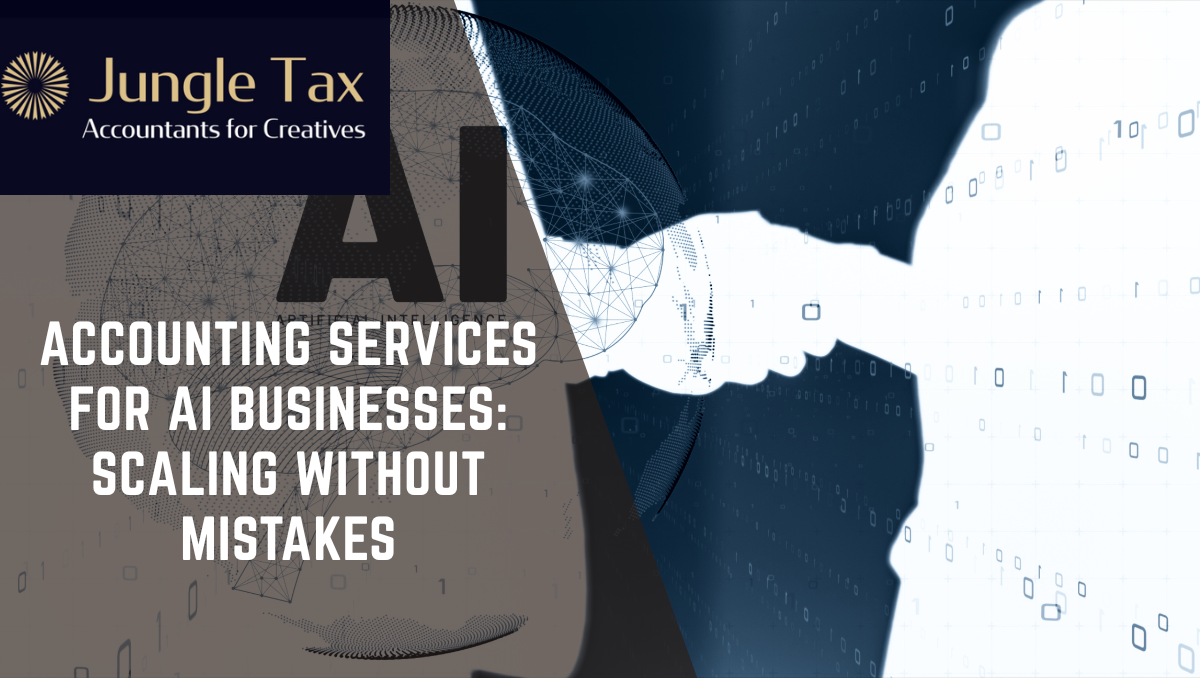
Introduction
Artificial Intelligence (AI) is transforming businesses across the UK, from SaaS startups to tech-driven consultancies. However, rapid growth brings financial complexity. Many AI companies struggle to maintain accurate financial records, meet tax obligations, and scale efficiently without errors.
Professional accounting services for AI businesses play a crucial role in avoiding mistakes that could derail growth. From bookkeeping and financial reporting to tax planning, these services allow founders to focus on innovation while ensuring compliance. In this guide, we’ll explore how AI startups can manage finances effectively and scale without costly accounting errors.
Why AI Startups Need Specialist Accounting
AI businesses differ from traditional startups. Revenue models are often subscription-based, with investment rounds, grants, or equity funding as sources of capital. Additionally, AI companies may incur substantial research and development (R&D) expenses that are eligible for tax relief.
General accountants may not understand the nuances of AI operations. Partnering with accounting services for AI businesses ensures proper classification of revenue streams, optimised R&D tax credits, and accurate financial statements. Startups avoid misreporting income, which can trigger HMRC scrutiny or investor concerns.
For more guidance, the ICAEW offers advice on tech business accounting practices.
Common Financial Challenges for AI Startups
AI companies face several accounting hurdles:
- Complex revenue recognition: Subscription fees, licensing, and SaaS revenue require precise recording to align with Generally Accepted Accounting Principles (GAAP).
- R&D tax credit eligibility: Many AI startups qualify for relief, but errors in claims can result in delayed refunds.
- Equity and funding management: Tracking investments, stock options, and share allocations needs specialised accounting.
- Cash flow management: Rapid hiring, infrastructure costs, and software licenses demand accurate forecasting.
Utilising AI-powered accounting experts from startup companies helps mitigate these challenges while keeping financial statements investor-ready.
Setting Up Robust Financial Systems
A solid financial foundation is key to scaling. Financial management for AI companies involves:
- Implementing accounting software customised for tech businesses
- Automating invoice processing and expense tracking
- Reconciling bank statements regularly
- Monitoring cash flow projections and runway
These systems prevent mistakes like missed invoices, inaccurate reporting, or incorrect VAT filings. Outsourcing these tasks to accounting services for AI businesses provides efficiency and ensures compliance with HMRC digital filing standards.
Tax Planning for AI Businesses
Effective tax planning is critical for AI startups. Proper strategies reduce liabilities and improve cash flow:
- R&D Tax Credits: Claim up to 33% of qualifying R&D expenditure.
- Capital Allowances: Deduct costs of qualifying assets, including computers and servers.
- VAT Compliance: Ensure proper VAT registration and returns for international clients.
- Corporate Tax Planning: Minimise tax through legitimate allowances and timely payments.
Specialist tax planning for AI businesses ensures these benefits are maximised, avoiding penalties or HMRC disputes.
Scaling Without Accounting Mistakes
Mistakes during growth can be costly. Common errors include:
- Misclassifying revenue or expenses
- Ignoring deferred income or liabilities
- Late VAT or corporation tax submissions
- Poor investor reporting
By hiring accounting services for AI businesses, founders can delegate these complex tasks. Experts maintain accurate ledgers, generate investor-ready reports, and ensure timely HMRC compliance. Scaling becomes smoother and less stressful.
Investor Expectations in AI Financial Reporting
Investors expect clear, accurate financial reports before funding rounds. They scrutinise:
- Cash flow forecasts and runway projections
- Revenue recognition practices
- R&D investments and expense tracking
- Profitability and growth metrics
AI startups that work with AI startup accounting experts can provide detailed and credible financial reports. Accurate reporting not only secures funding but also builds investor trust.
Best Practices for AI Startup Accounting
Here are essential practices to adopt:
- Segregate personal and business finances to simplify tax reporting by avoiding the mingling of funds.
- Utilise cloud-based accounting tools to Automate transactions and maintain up-to-date, real-time records.
- Keep detailed documentation: Receipts, invoices, and contracts are crucial for audits.
- Regularly review financial statements: Monthly checks reduce errors and identify trends.
- Engage specialist accountants: Professionals reduce risk and optimise tax planning.
These strategies ensure compliance and provide founders with greater confidence when making business decisions.
Conclusion
Scaling an AI startup requires careful attention to financial management. Without proper accounting, errors can lead to penalties, lost funding opportunities, and cash flow issues.
Accounting services for AI businesses provide the expertise needed to manage complex revenue streams, claim R&D credits, and ensure tax compliance. From investor-ready reports to automated bookkeeping, these services allow founders to focus on growth and innovation.
With professional support, AI startups can scale efficiently, avoid mistakes, and maximise their financial potential.
Call to Action (CTA)
Ready to optimise your finances with expert guidance? Contact JungleTax today at hello@jungletax.co.uk or call 0333 880 7974 to speak with our specialist accountants.
FAQs
Accounting services for AI businesses help manage bookkeeping, tax planning, and financial reporting for startups in the AI sector.
They identify qualifying expenses, prepare claims, and ensure compliance with HMRC R&D guidelines.
Financial management for AI companies involves unique revenue models, funding structures, and R&D expenses, distinct from standard accounting practices.
As early as possible — ideally during initial funding rounds or before scaling operations — to ensure proper financial structures are in place.
Yes. They provide detailed, compliant reports that meet investor expectations and simplify funding rounds.
